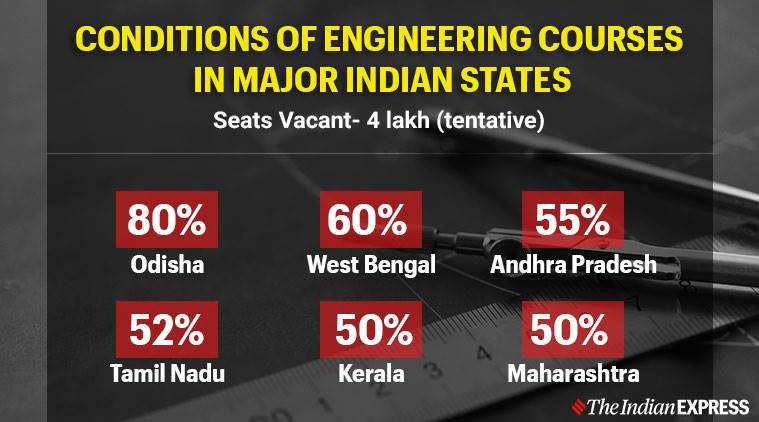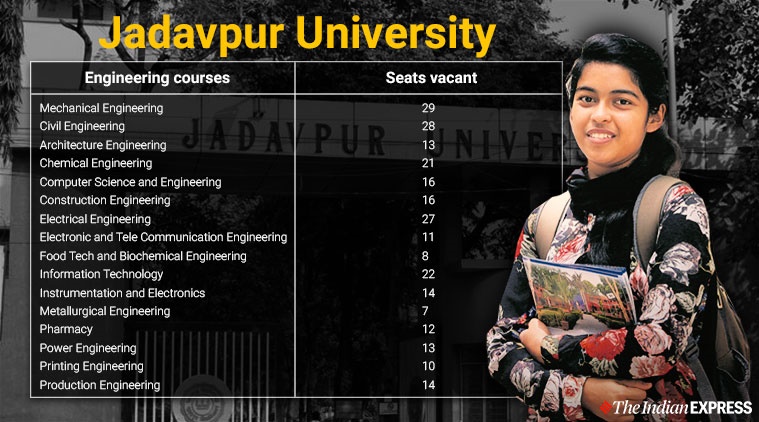Meanwhile, all seats in the in the 23 colleges of the Indian Institute of Technology (IIT) have been filed in the current academic session 2019-20Over fifty per cent seats in engineering colleges across India are vacant. With 80 per cent unoccupied seats, Odisha tops the chart while West Bengal has 60 per cent vacant seats in engineering colleges.
Advertising
According to AICTE chairperson Anil Sahasrabudhe,
out of the 14 lakh engineering seats available across the country, only 10 lakh students took admission. “A committee, formed last year to draft a plan regarding engineering education, found that the number of seats available outnumbers the demand,” Sahasrabudhe told
indianexpress.com.

80% vacant seats: Why few takers for engineering seats in Odisha, WB
There were no takers for around 27,000 seats in the government and private engineering colleges in Odisha this year. Out of the 34,223 seats for students in various engineering colleges, only 20 per cent of them got filled.
Odisha Private Engineering College Association (OPECA) secretary Binod Dash blamed the job markets for this dismal statistics. “The fall in engineering seats is due to a lack of interest among students in pursuing B.Tech courses as there are fewer jobs available in the field. “In the last five years, only 30 per cent students got placement,” Dash said.
However, a professor from the Kalinga Institute of Industrial Technology criticised the curriculum and education pattern of the Biju Patnaik University of Technology (BPUT). “The curriculum followed by the BPUT is quite outdated and students, after clearing their Bachelors, failed to get jobs in their desired sectors,” said the professor on the condition of anonymity.
In West Bengal, over 60 per cent of the engineering seats remained vacant this year as only 10,525 students took admission in engineering courses.

There are over 32,700 seats on offer in various engineering colleges in West Bengal. This year, a total of 22,175 seats remain vacant, as compared to 16,000 last year, according to the registrar office of WBJEEB.
“The middle-rung engineering colleges had hardly any takers this year. Over 18,000 seats went vacant in private engineering colleges, which is a 30 per cent more than last year’s 13,375,” said a WBJEEB official.
According to Chiranjib Bhattacharjee, head of the engineering department, Jadavpur University, 261 seats remained vacant. “Several candidates, who had locked the seats during the counselling process, did not turn up for admission,” explained Bhattacharjee.
Among all courses in Jadavpur University, maximum seats remain vacant in mechanical engineering at 29, followed by civil engineering at 28. According to data available on the varsity’s website, 13 seats are vacant in the architecture course, chemical engineering – 21, computer science and engineering – 16, construction engineering – 16, electrical engineering – 27, electronic and telecommunication engineering – 11, food tech and biochemical engineering – 8, information technology – 22, instrumentation and electronics – 14, metallurgical engineering – 7, pharmacy – 12, power engineering – 13, printing engineering – 10, production engineering – 14.
Meanwhile,
all seats in 23 colleges of the Indian Institute of Technology (IIT) have been filed in the current academic session 2019-20. There are 13,604 undergraduate seats at the IITs.
In 2018, 118 seats at IITs had found no takers while 110 seats remained vacant in 2017, 96 seats in 2016, 32 seats in 2015, three seats in 2014 and 149 seats in 2013.
Over 50% seats in Andhra Pradesh, Tamil Nadu, Kerala, Maharashtra go vacant
Over 70,000 qualified candidates opted to skip admission in Andhra Pradesh colleges. Around 60,000 candidates took admission in various Engineering colleges this year out of the 1.32 lakh candidates who had qualified EAMCET (Engineering, Agriculture and Medical Common Entrance Test) this year. Similarly, 52 per cent seats of engineering colleges in Tamil Nadu remained vacant.
In Kerala, a total of 50 per cent engineering seats remained vacant though the total number of private colleges affiliated to the
APJ Abdul Kalam Technological University reduced to 147 from 152 in the 2017-18 academic year. This year, 24,451 seats out of the total 49,571 seats remained unoccupied.
Advertising
The admission process for the Bachelor of Engineering (BE) closed this year in Maharashtra, with 50 per cent of the admission. There are no takers for 24,344 seats in Mechanical Engineering, and 14,002 seats in Civil Engineering, as per the data shared.





